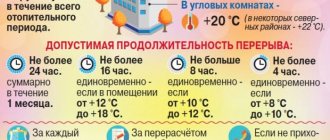Author of the article
Alexander Georgievich Kondratiev
An electrical engineer by training, he worked as an electronics engineer, chief engineer at a food company, and general director of a construction organization.
It's cold and damp outside, and residents are impatiently waiting for the heating to be turned on. Until recently, the heating season began on schedule. This is extremely inconvenient both for residents of an apartment building and for public utilities. Residents could wait weeks for their heating to be turned on when temperatures outside were low. Or walk like boiled crayfish at high temperatures.
Now the heat supply depends on the weather. Given the country’s extensive territory, heating will be turned on in different cities on different dates in the fall of 2022.
Who decides on the start of the heating season and on what basis?
Tying the start of the heating season to calendar dates turned out to be ineffective. This led to improper consumption of thermal energy.
In 2011, the Russian government signed Resolution No. 354. It regulates the supply of heat to the apartments of apartment building owners. According to the law, local authorities regulate standards for turning on heating in a region or locality. They are guided by the average daily temperature and weather forecast.
The average daily temperature should not exceed +8 degrees Celsius for five days. This is the main condition for turning on central heating.
To do this, measurements are taken at different times of the day. Typically, the coldest time and maximum daytime temperature are selected. Add these indicators and divide by two. The result is an average daily result.
Since the decrease in air temperature may be short-term, long-term weather forecasts are also taken into account. If prolonged warming is forecast, there is no need to turn on the heating supply.
It's warm outside, but the radiators are hot: what to do?
Quite often situations arise when the air temperature remains at levels acceptable for shutdown, the street becomes warm, but the centralized heating system continues to work. The apartments are stuffy. Residents of apartment buildings are forced to constantly ventilate their rooms. We can say that at this time the thermal power plant heats the street.
However, complaining to the housing and communal services service, the municipality, the Thermal Power Plant and any other institution is useless. The peculiarity of the centralized heating system is that after turning it off, it cannot be turned on immediately.
Therefore, until the municipality is sure that there will be no cold snap in the near future (the decision is made on the basis of meteorological reports), an order to end the heating season will not be issued.
Due to heating in April and May, apartments become hot and stuffy, and this continues for many years. However, there are no technical capabilities to solve the problem yet, since this would require completely changing the system in all cities.
When will heating be provided in St. Petersburg?
Cold, windy and rainy weather set in in the northern capital at the beginning of September. Citizens are eagerly waiting for the batteries to be turned on. The Committee on Energy and Engineering Support of St. Petersburg reported that in apartment buildings everything is ready to supply heat (information as of 09/03/2021). Heat supply will begin in mid-September, despite the fact that the average air temperature is forecast to be above +8 degrees. Hospitals, kindergartens and schools will be the first to connect.
Approximately from September 15, periodic flooding will begin in apartments (the batteries will be turned on for short periods and then turned off). Regular heat will be turned on when average daily temperatures drop below +8.
The contested provision does not violate the citizen’s rights to health protection
The Supreme Court of the Russian Federation indicated that clause 5 of Rules No. 354 does not violate the plaintiff’s rights to health protection. On the contrary, compliance with this provision ensures that the residential premises are suitable for habitation.
The court also rejected the argument about the inconsistency of the disputed clause with the physiological needs of a person in ambient temperature, citing the fact that in cases of challenging legal acts, it checks such an act for its compliance with other normative legal acts that have greater legal force.
When will the heating be turned on in Moscow in 2022?
The Moscow City Hall makes this decision based on the average daily air temperature. If you believe the weather forecast, September in the capital will be warm, and only at the very end of the month the temperature will drop below +8 degrees. Therefore, heat should be provided to apartments no earlier than October 1.
The dates when the heating was turned on in the previous five years are in our table.
| Year | Start date of the heating season in Moscow |
| 2016 | September 21 |
| 2017 | September 28 |
| 2018 | October 1 |
| 2019 | 23 September |
| 2020 | September 28 |
What temperature should be in the apartment
According to SanPiN 2.1.2.2645-10 “Sanitary and epidemiological requirements for living conditions in residential buildings and premises”, the optimal and permissible temperature standards in the premises of residential buildings are:
| Name of premises | Air temperature, °C | |
| optimal | acceptable | |
| Cold season | ||
| Living room | 20-22 | 18-24 |
| The same, in the areas of the coldest five-day period (minus 31°C and below) | 21-23 | 20-24 |
| Kitchen | 19-21 | 18-26 |
| Toilet | 19-21 | 18-26 |
| Bathroom, combined toilet | 24-26 | 18-26 |
| Inter-apartment corridor | 18-20 | 16-22 |
| Lobby, staircase | 16-18 | 14-20 |
| Storerooms | 16-18 | 12-22 |
| Warm period of the year | ||
| Living room | 22-25 | 20-28 |
Approximate schedule for turning on heating in Russian cities in 2021
Here is a schedule of heating connections last year (2020) in Russian cities based on orders from local administrations. In the fall of 2022, heat turn-on dates will be close to last year's numbers. But they may differ in one direction or the other.
For clarity, we have summarized the data on what date the heating is turned on in a table.
| City | Date of supply of thermal energy |
| Moscow | September 28, submitted early |
| Saint Petersburg | October 15 |
| Novosibirsk | September 22nd |
| Ekaterinburg | September 15th |
| Kazan | September 21 |
| Nizhny Novgorod | September 22nd |
| Chelyabinsk | September 28 |
| Samara | September 22nd |
| Omsk | September 22nd |
| Rostov-on-Don | October 15 |
| Ufa | September 17 |
| Krasnoyarsk | 23 September |
| Voronezh | October 15 |
| Permian | September 15th |
| Volgograd | October 12 |
| Krasnodar | October 16 |
Having analyzed the data, we see that the difference in heating supply dates in different regions is more than a month.
How does this happen
Preparatory work for the heating season begins in April 2022. Local authorities, together with service organizations, prepare regulatory documents.
The documents reflect the provisions:
- A representative of an organization that provides operation and maintenance of thermal power facilities. A specialist is appointed from persons with higher thermal engineering education. His deputy is appointed in the same way. They are required to undergo certification annually.
- The commission that prepares the energy complex for the heating season. Members are required to monitor the serviceability of thermal facilities and performance during the autumn-winter period.
- The start and end dates for preparatory work are determined.
- Measures are drawn up according to which the equipment is prepared for operation in the autumn-winter period. Activities are coordinated with all interested organizations. After approval it is approved.
- Measures are being developed to prepare documentation and monitor the verification of work, the condition of thermal equipment and readiness for operation.
- The order of commissioning and testing work is determined.
Upon completion of the work, an acceptance certificate and technical passport are drawn up. After the heating is turned on, the apartments must maintain the temperature presented in the table.
| Room | Permissible temperature in degrees Celsius |
| Living rooms | At least 18 |
| Premises with external walls on three sides | Not lower than 20 |
| Bathrooms | Not lower than 25 |
| Staircases and cages | 14-20 |
| Inter-apartment corridors | 16-22 |
| Basements and attics | Not lower than 4 degrees |
This shows that for permanent residence, the temperature in the apartment should be maintained at 18-25 degrees, and in industrial premises at 16-24 degrees. This is enshrined in law.
It turns out that heating fees can be returned! Read where to complain and what to do if it’s cold in your apartment during the heating season.
First of all, heating is provided to children's and socially significant institutions. Then they turn on the heating for residents in apartment buildings.
What law regulates the process of heating residential premises?
Relations in the field of heat supply to residential premises are regulated at the federal level by the following legislative acts:
- Federal Law “On Heat Supply” dated July 27, 2010 No. 190-FZ.
- Decree of the Government of the Russian Federation “On the provision of public services” No. 354 dated May 6, 2011.
- GOST 30494-2011 “Indoor microclimate parameters” dated 01/01/2013.
The above documents define the relationship between owners and utilities, the start and end dates of the heating season, as well as the rules for the provision and calculation of utilities.
The house is cold, but the heating is not turned on
People are freezing, but the heating season still hasn’t started. The only way out is to pester the city authorities: call the administration and the housing and communal services hotline, write to the website and email.
Another situation: the heating season has begun, all houses are connected, but your radiators are cold. In this case, you must wait five days, as the heating is started according to schedule. If the batteries are not turned on during this time, this indicates a problem that needs to be solved.
To do this, residents must:
- Contact the housing department. You can call, or better yet write a statement in duplicate. Keep one for yourself with a mark of acceptance. Specialists are required to check the system as soon as possible. Take all measures to resolve immediately, whether there is air in the system or other technical issues. A specialist solves a local issue on the spot.
- If the radiators are cold throughout the entire entrance, a commission must be invited. It includes representatives of the management company, housing inspection and residents of the apartment building. Measurements are taken and a report is drawn up. It is drawn up in triplicate for each party. This is the basis for recalculating the heating fee and for making a decision to eliminate the malfunction.
- If the management company’s employees do not correct the malfunction, residents are required to file a complaint with a higher organization, local administration and Rospotrebnadzor. Usually this is enough to make the apartment comfortable.
Where to complain if there is no heating
Knowing where to complain if there is no heating, you can achieve a quick solution to the problem. If, after inspecting the heating system by a utility worker, the heating is still not turned on, you can contact the following authorities:
- to the management company servicing the house;
- to a housing association at home;
- to a service that maintains the house;
- to the city housing inspectorate.
If the requests and demands of the residents were ignored by the employees of the above authorities, where to complain about heating in this case? Then more stringent measures should be taken.
You should contact:
- Rospotrebnadzor. You can send a complaint by mail or using the online service of this organization;
- prosecutor's office The complaint is sent in the same way as in the previous case;
- local administration;
- court.
But a complaint about the lack of heating should be sent to these authorities if the utility service specialists have not taken any measures and ignore the complaint of the residents of the house. After all, it is possible that a housing office employee will arrive as soon as possible after the call and quickly solve the problem. If a utility service does not perform its duties at the proper level, higher authorities can identify the culprit and fine the organization, bringing it to serious responsibility.
Heating interruptions can occur not only in a residential apartment, but also in a company’s office premises. Employees often have a question: if there is no heating at work, where can they complain? First, you should inform the head of the company about the presence of such a problem, and also inform the landlord if the office is rented. Further actions are the same as in the absence of heating in the apartment.
Can the heat be turned on earlier or later than the official deadline?
The approved schedule may change in different directions. Resolution No. 354 defines the conditions for turning on the heating.
Residents should take into account that the 2022 heating season will begin with an average daily temperature of no higher than 8 degrees Celsius.
To do this, measure the outside air temperature. Measure twice a day. At night during the coldest period and during the day when the temperature is highest. Add the readings and divide by two. This results in an average temperature. It should be less than or equal to eight degrees for the last five days. At higher temperatures, the heating is not turned on: the apartments are still relatively comfortable, and the heating system does not freeze.
When the air temperature is high, residents will have to suffer from the heat and overpay for heat. Thus, the heat can be turned on earlier or later than planned. It all depends on the average daily outside temperature and the weather forecast.
What problems may arise when starting heating
If the heating is turned on, and it’s cold in your apartment, most likely you need to bleed the air that has accumulated in the pipes - eliminate the airlock that is preventing the coolant from passing through. You can bleed the air yourself, or you can call ADS and they will send a plumber.
If you tried to bleed the air yourself and nothing changed, perhaps a pipe is clogged somewhere and a blockage has formed - call a plumber. If the shut-off valves break and/or a leak develops, urgent repairs are needed. Submit an application to the ADS (this can be done by calling or contacting them in person).











